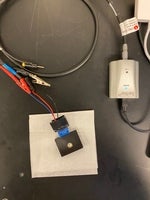Capstone Team wins Esch Competition and advances personalized medicine for depression treatment
Pictured above Andrea Parra, Sara Thompson, Nube Torres and Karla Castro
Nanotechnology Engineering Team 18 won this year’s Esch Competition with their project GeneDetek. Team members Karla Castro, Andrea Parra, Sara Thompson, and Nube Torres developed an electrochemical biosensor for genetic mutation detection.
Depression is a complex mental health condition that affects millions worldwide. For many patients, finding an effective treatment can be a daunting challenge, often complicated by adverse side effects of prescription drugs.
A patient's genetic makeup and DNA can affect whether a drug helps them, has no effect or causes an adverse reaction. Depression medication could, in some patients, trigger migraines or cause side effects such as mood changes. Many patients discontinue antidepressant therapy too early due to the unpleasant side effects of the prescribed drugs.

GeneDetek's prototype
Currently, pharmacogenetic testing can reveal how a patient’s DNA may affect response to pharmaceutical drugs. However, pharmacogenetic testing is not covered by provincial health plans. Patients pay between $300-$1,500 for the testing which involves invasive blood testing.
Pharmacogenetic testing is normally done in a lab setting and requires the use of a number of resources making the process expensive. To address this problem, Team 18 developed a compact non-invasive electrochemical biosensor that can detect genetic mutations linked to poor responses to antidepressants. Their prototype has the potential to provide a cost-effective, point-of-care solution that delivers specific and quick results in less than 24 hours.
Their prototype works by extracting DNA from saliva, applying it to a sensor, and capturing an electrochemical signal. The GeneDetek app then analyzes this data, producing a detailed report of the findings. This proof-of-concept technology shows great promise for future use in patient care.
The team worked with their supervisor, Professor Shirley Tang and PhD students Pramod Kalambate and Pei Li to come up with their final iteration of the project. They used a modified screen-printed electrode that would take DNA from saliva and compare the current signal of the electrode before and after the binding of the target DNA.
The team approached their project from a marketing perspective when they advanced to the Esch Competition. During the competition, the team focused on the method by which they would market their product. They identified their primary clientele as healthcare professionals in institutional settings, while individuals diagnosed with depression would represent their secondary market.
“Once we got accepted for the pitch competition, it validated all the work we did. The Esch Competition was a really great experience,” says Parra. “We had to explain the project and we got good feedback. Winning the competition was very uplifting!”
Their prototype could have other biomedical applications. There is the potential to expand the array of genes that would be detectable so that physicians can personalize medications for individual patients.
Team 18 aspires to create a start-up in the years to come. Castro has always wanted to start her own business but will look for a job in industry for now. Torres will also go on to find a job in the biosensor industry and in the near future will enroll in medical school to become a doctor. Thompson will pursue a Master’s degree at the University of Waterloo. Down the road, Parra would also consider pursuing a Master’s degree but for now, will look for an industry position.
Congratulations to Team 18!